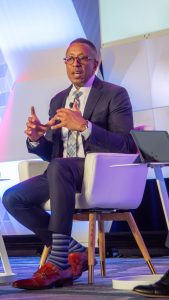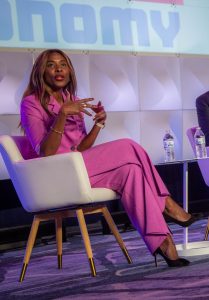
Contemplating International Workers Day & Philanthropy’s Role in Just Economy
May Day, also called International Workers’ Day, takes place annually each May 1st as a commemoration of both the struggles and accomplishments made by workers. Celebrated mostly outside of the United States, the holiday born out of the fight for an 8-hour workday has since transformed to include many intersecting areas of economic justice including immigration reform, workers’ rights and police accountability.
As the world begins to reflect on the history of this holiday, let us not forget that philanthropy plays a crucial role in bringing about economic justice and equity.
Recently at the 2023 Just Economy Conference, NCRP President and CEO Aaron Dorfman moderated a plenary panel at the NCRC conference on philanthropy’s role in building a just economy. The panel included Allan Golston, President of U.S. Programs for the Bill and Melinda Gates Foundation, and Asahi Pompey, President of Goldman Sachs Foundation.
Dorfman wanted to dig into the strategic approach these organizations utilized and how their approaches contrasted with those who think building power is essential to creating a just economy.
Their answers are a telling reminder of how some in philanthropy are approaching how best to fund those working to bring racial and economic justice in our changing world.
Q: DORFMAN
Some of what both of you have been describing is helping people advance economically within the confines of our current systems.
Other foundations that work on these issues are focused on building power so that communities can change laws and policies that are keeping them down economically.
I’m thinking of foundations like the Ford Foundation or the Omidyar Network’s Worker Power Initiative, or the James Irvine Foundation in California. How did you all settle on your strategy as right for your foundation? And how is that complementary to or is it in tension with the work of these more systems-changed policy change-focused funders in this space?
A: GOLSTON
While I’d be interested in getting your thoughts on that to what you see in the sector, but similar to you, we have a clearer perspective on what our differentiated core competencies are. And so that shapes our strategy, and I would say it’s a bit hybrid.
So, for example, we have partnered with the Irvine Foundation and the Ford Foundation in supporting pulled funding in the family and workers fund to get resources to families and workers to really boost quality jobs, access to jobs, etc. So that’s an example where we fundamentally think more capital has to go to the types of organizations and entities and communities that they engage in and fund so that’s an example where we put capital; we’re not trying to drive a specific strategic goal. But they know what they’re doing. They have the relationships, they’re proximal to the communities that we really need to support. And that’s an example of how we approach it.
A different example would be that may be a bit in the middle is funding partnerships that we do with Cognizant, the Schusterman Foundation, a whole host of other foundations across the country that supports an organization called Work Rise. Work Rise is an organization hosted at the Urban Institute, and its objective is to bring partners across policy and research, practitioners, advocates, to really both identify, test, and design ideas that our leading edge that many philanthropic organizations, including ours wouldn’t have necessarily funded or known about, but have the transformative power potentially, to advance the labor force and labor markets of the individuals that we’re trying to get to through our strategy. And that’s where we see, okay, they have, they’re governed differently. They’re governed by proximal partners; they decide where the resources go. And they identify the projects, the research organizations, they partner with the HBCU community to bring in students and researchers who have much more lived experience and understanding in solving the problem. So that’s another example where we don’t take the traditional approach, you will see us take some of our other strategies.
We’re pretty excited about it. We’ve been in this space for a very short time, we started with a four-year commitment of roughly $200 million. Last year, we doubled that commitment to $450 million over a four-year period, to really make sure that we’re supporting more proximal partners, we’re pushing as much decision making down to the communities and the partners who engage in those communities as possible. But with clear objectives of making lives better now, both through access to safety net benefits, boosting the workforce, supporting and improving job quality, by supporting local actors, decision makers, government entities at a local level, to identify, network, and implement best practices, both with just understanding what they are, and with technical assistance, and then also bringing together and convening partners across sector to be able to collaborate in ways to advance that agenda and to leverage each other’s collective assets.
A: POMPEY
Here’s the way I think about it. The premise of your question is, that sets up a dichotomy, right? There are these philanthropic organizations that are focused on sort of power change, system and change. And then there are other philanthropic organizations or efforts that are focused on other areas. I would argue that there is no power change without activating capital, money, the economy, and that’s what we do at the bank. So all of our initiatives ultimately will lead to power change if we’re successful in moving money and markets and redistributing it. And frankly, I would say addressing where there’s been a capital misalignment to opportunity, and I’ll tell you a specific example, we have an initiative that’s under 1 million Black women called Black in Business. And here’s what we were noticing.
Black women are starting businesses faster than any other demographic in the United States. So, when you think about the entrepreneur is a guy with his hood, and you know, in the in the garage, replace that and think of that, as a Black woman. She’s starting businesses faster than any other demographic. However, what we were also seeing is that within three years, 97% of those businesses failed. And to compound it, she was in a worse position after having started that business. Why? She’s now in debt. She’s borrowed from friends and family. If she had a 401 K, she borrowed against that, and that’s now gone. And maybe she quit her job to put her full effort into that business. And so we stepped in and said, what if we could pull through all that grit and effort that it takes to launch a business? We were able to meet her when she started that business and be able to help her business grow and be successful. She hires individuals in her community, entrepreneurs become community leaders and activists. We’ve seen that the data supports it over time, and really have real economic change. That’s our effort in Black in Business. If you know Black women entrepreneurs, who would be eligible for Black in Business, send them my way, in particular.
But what that does is that’s about power change, because all of a sudden, that entrepreneurs are those hundreds of entrepreneurs. So far, we’ve been able to work with 460, but we’re making the program larger, they are becoming power centers in their community over time, job creators, innovators. And so I would argue that that form of philanthropy is about power and system change. If we’re able to get those. I want to get all 97% to being successful, we won’t, but we’re going to darn well do our best to do it, because they’re putting in the effort and it’s on us to meet them where they are to help them grow.
Click To View the Entire Video and Transcript
Suhasini Yeeda is the Communications and Marketing Associate at the National Committee for Responsive Philanthropy.



